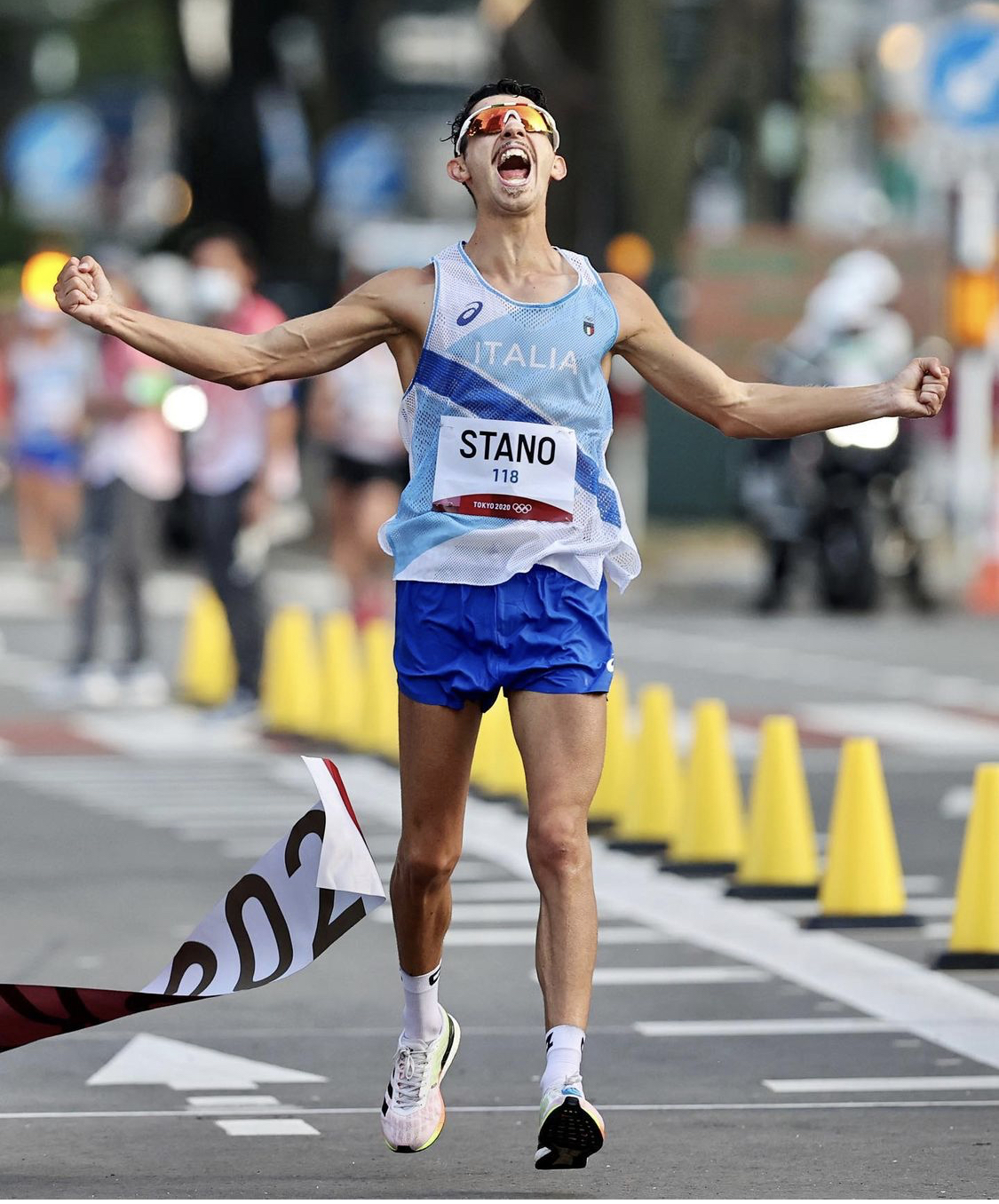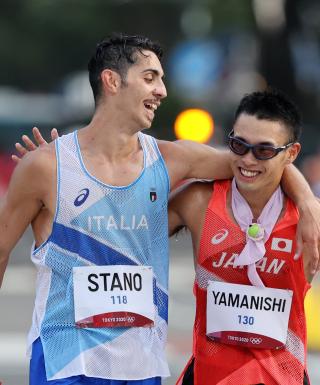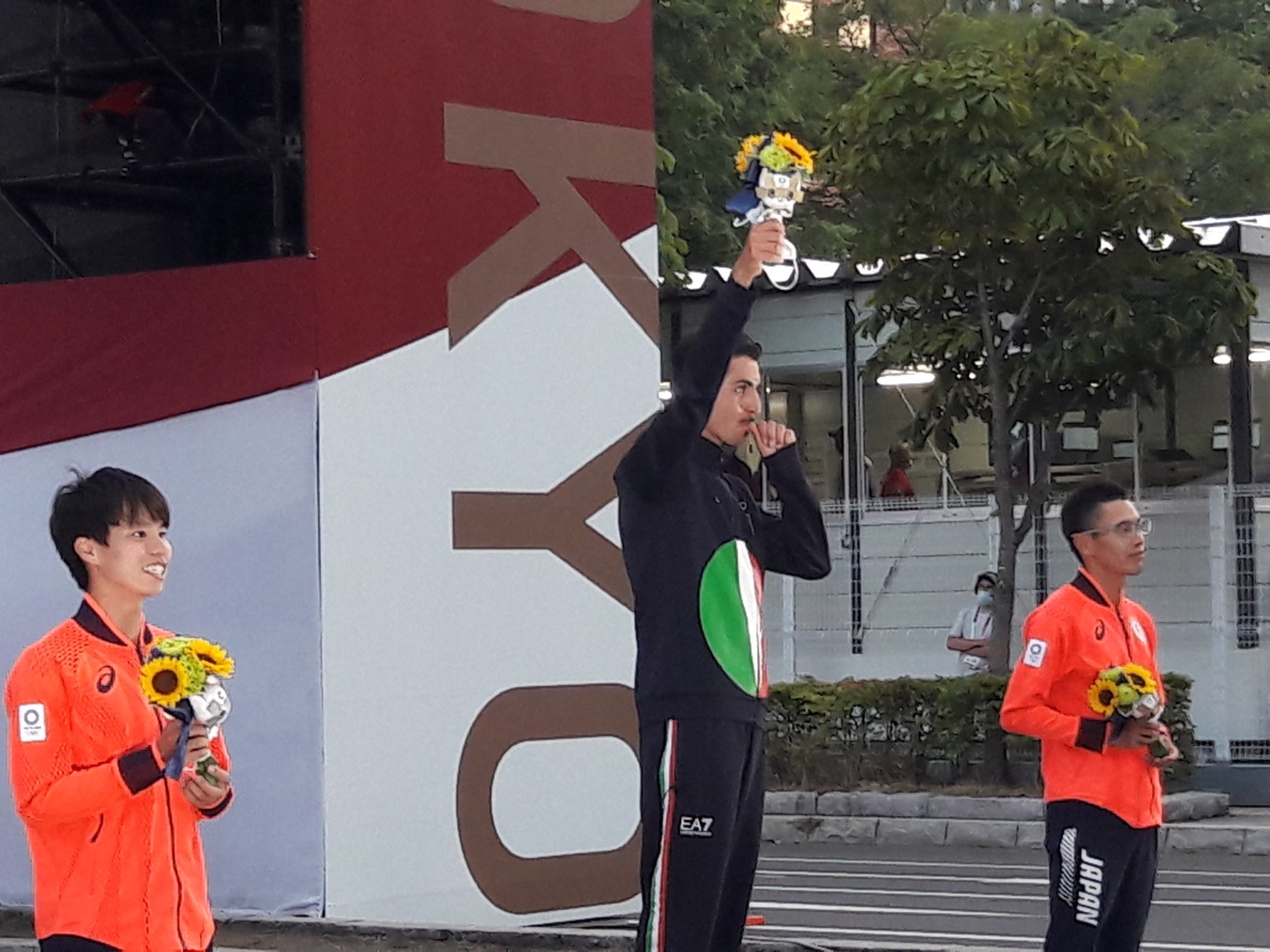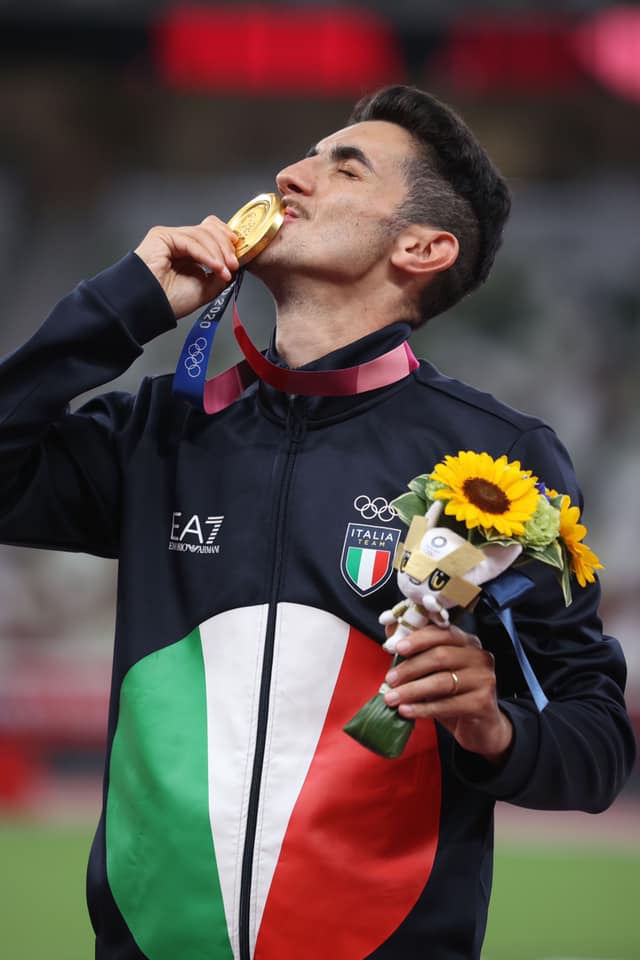And finally there we are.
After five years of waiting, the Olympic Games return with the 20km men relegated, along with the other walking races and the two marathons, to Sapporo on the island of Hokkaido with the hope that the temperature and humidity are better than those of Tokyo.
And let's start with the weather forecast
Judges
From left to right
- Daniel Michaud (CAN)
- Anne Froberg (FIN)
- Pierce O'Callaghan (IRL)
- Jean-Pierre Dahm (FRA)
- Dolores Rojas (ESP)
- Zoe Eastwood-Bryson (AUS)
- José Dias (POR)
- Fun Wang Tak (HKG)
squat: Frederic Bianchi (SUI - Chief Judge)
Report of the race
The start is given punctually at 4:30pm.
Quite slow start on the 4:18/km pace.
The first 2km see Toshikazu Yamanishi (JPN) in the lead in 8:29, but soon after Wang Kaihua (CHN) lengthens the pace which is followed by Sandeep Kumar (IND).
The two gain about ten meters which then turn into ten seconds.
- 5:03 pm
We are at 8km with the couple Wang Kaihua (CHN) and Sandeep Kumar (IND) still in the lead. The group of chasers is 12 athletes.
Meanwhile one of the most interesting athletes in the race Salih Korkmaz (TUR) was forced to abandon the race shortly after 5km when he was still in the leading group. A probable muscle strain put an end to his desire for glory.
- 5:12 pm
We are halfway through the race.
Still the leader is Wang Kaihua (CHN) who moved up to 10km in 40:55. Sandeep Kumar (IND) took two red cards per contact and returned to milder advice by breaking away (he is now in 12th position)
The group of chasers is made up of Toshikazu Yamanishi, Koki Ikeda, Massimo Stano (ITA), Diego Garcia (ESP), Alvaro Martin (ESP), Zhang Jun (CHN) and Vasiliy Mizinov (ANA) who, however, has two reds cards per contact.
In the meantime Jose Alejandro Barrondo (GUA) who had passed 28th at 9km collected 5 red cards and was disqualified.
- 5:36 pm
We are at 16km led by a group composed of Massimo Stano, Diego Garcia, Toshikazu Yamanishi, Koki Ikeda, Wang Kaihua, Zhang Jun and Alvaro Martin.
The passage is 1:05:38 and Massimo Stano must lead.
Behind them is Christopher Linke (GER) at 11 seconds.
Another favorite, Vasiliy Mizinov, who between 12km and 13km had been stopped for 120 seconds in the penalty area and had restarted, suffers the fourth red card (all four by contact) and is disqualified before the 14km.
- 5:43 pm
At 18km the fight for medals, except for interventions by the jury, is well defined.
Shortly after the 17km Massimo Stano, Toshikazu Yamanishi and Koki Ikeda have lengthened the pace and cleared Alvaro Martin, Diego Garcia and Wang Kaihua.
Perseus Karlastrom (SWE) in the shade all day is only in 9th position preceded also by the very young Zhang Jun.
- Last two km
The color of the medals will be decided in the last two laps and the technical situation will also be important. At 17km the first three were exempt from red cards.
The first to receive a red cards is Yamanishi shortly after the passage to 18km.
Massimo Stano takes the lead at the bell with Koki Ikeda (1:17:22) at his ribs. Toshikazu Yamanishi strangely raises the white flag and is 6 seconds behind.
Within three minutes, both Ikeda (5:45 pm) and Stano (5:48 pm) receive a red card (for lack of contact), just as Stano stretched and gained a couple of seconds. At 5:49 pm Ikeda receives the second red card that puts an end to the fight for the heaviest medals.
The three think for a moment and are about to cross the finish line in their consolidated positions.
Gold to Massimo Stano (ITA) in 1:21:05
Silver to Koki Ikeda (JPN) in 1:21:14
Bronze to Toshikazu Yamanishi (ITA) in 1:21:28
Fourth place to Alvaro Martin (ESP) in 1:21:46
Fifth place to Christopher Linke (GER) in 1:21:50
Sixth place to Diego Garcia (ESP) in 1:21:57
Seventh place to Wang Kaihua (CHN) in 1:22:03
Eighth place to Zhang Jun (CHN) in 1:22:16

From the web-site of World Athletics (by Bob Ramsak)
Propelled by a relentless final kilometre charge, Massimo Stano held off Japanese favourites Koki Ikeda and Toshikazu Yamanishi to take the 20km race walk title in Sapporo on Thursday (5), the third Olympic crown for Italy in this event and the third gold medal for his nation at these Olympic Games.
While Stano has been a regular on the race walk circuit for the better part of the last decade, the 29-year-old didn't have a single senior regional, continental or global medal to his name until he crossed the finish line this afternoon in this city's central Odori Park, nine seconds clear of Ikeda.
"Every day in my mind, I repeated: 'I am the strongest, I am the strongest', and I was," said Stano, who crossed the finish line sucking his right thumb, a motion to dedicate his victory to his four-month-old daughter, Sophie. "My only strategy was to stay in the front.”
That strategy became apparent in the latter stages of the race, but he kept it close to his chest in the early going, preferring to watch from a significant distance as Wang Kaihua of China and India's Sandeep Kumar made the first big break of the race, the pair moving away from the 30-odd man pack just four kilometres into the contest.
Wang, who was eighth at the 2019 World Championships, arrived in Sapporo as the third-fastest man in history after a 1:16:54 performance in March, so his ambitions to try to steal the race early weren't a surprise. But those of the unheralded Kumar were.
The two passed eight kilometres together in 32:56, 11 seconds clear of a chase pack of 12 that included Stano, Ikeda and Yamanishi. But just two minutes later Kumar began drifting back and out of contention, swallowed by the chase pack in the ninth kilometre.
Wang forged on alone, hitting the nine-kilometre mark in 36:55 and the midway point in 40:55, 10 seconds clear of his nearest pursuers.
Yang reached 12 kilometres (49:03) alone, but, visibly beginning to strain, he too was gobbled up by the chase pack about two minutes later, with Spaniards Alvaro Martin and Diego Garcia, Japan's Yamanishi and Ikeda and Stano in the front pack.
By this time sizeable crowds began gathering along pockets of the one kilometre loop course, giving the Japanese duo something virtually all athletes at these Olympic Games were missing: fan and spectator support.
After swapping the lead a few times with Yamanishi, Stano lead the group of seven through 15 kilometres in 1:01:27 and after that, never relinquished the lead.
Just beyond the 17 kilometre point, three men remained in the hunt: Stano and Yamanishi and Ikeda, who were trying to apply the pressure as a two-flank attack.
With just over 1:15 on the clock, Stano and Ikeda were the last men standing, carrying a six-second lead on Yamanishi when the bell sounded the last lap. Stano looked unstoppable and ultimately was, pulling away gradually over the final stretch before crossing the finish in 1:21:05.
The time was well off his 1:17:45 lifetime best from 2019, but was the second-fastest performance of his career. Those stats were likely the furthest thing from his mind as he was trying to process what he had just accomplished.
"For now, this is like a dream - and I don't want to wake up."
Ikeda clocked 1:21:14 and Yamanishi 1:21:28 to secure Japan's first two athletics medals of these Olympic Games.
"He was very tough and strong, but I didn’t want to lose,” Ikeda said. “I kept behind him but he pulled away from me. I then focused on the next goal which was silver.”
The International Olympic Committee made the decision to move the race walks and marathons to Sapporo in October 2019 to avoid the significantly warmer temperatures expected in Tokyo, located more than 800 kilometers south. Conditions in Sapporo were warmer than expected, with the mercury reaching 31 degrees Celsius at the start, but cooling as the race progressed.
“The first half (of the race) it was hot, especially the first 10 minutes, but then it was getting cooler and cooler," Ikeda said.
Christopher Linke of Germany, who equalled his fifth place finish from the Rio Games five years ago, concurred.
"It was hot but it wasn't so bad," he said. "I was training in warmer and more humid conditions so I was well prepared."
Bob Ramsak for World Athletics


